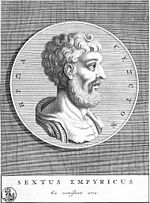"to the more recent skeptics"; Diogenes Laërtius attributes them to Agrippa. The five modes of Agrippa (also known as the five tropes of Agrippa) are:... 5 KB (572 words) - 18:55, 29 January 2024 |
(astronomer), Greek astronomer from the late 1st century Agrippa the Skeptic, Skeptic philosopher at the end of the 1st century Agrippa Menenius Lanatus, Roman consul... 2 KB (362 words) - 22:29, 21 January 2024 |
Pyrrhonism (redirect from Pyrrhonian Skeptics) only "to the more recent skeptics" and it is by Diogenes Laërtius that we attribute them to Agrippa. The five tropes of Agrippa are: Dissent – The uncertainty... 31 KB (3,819 words) - 17:07, 20 February 2024 |
through the use of the Ten Modes of Aenesidemus, the Five Modes of Agrippa, and the Pyrrhonist maxims. Pyrrhonism is mostly known today through the writings... 6 KB (710 words) - 03:59, 9 December 2023 |
Skepticism (redirect from Skeptic) government about an ongoing war then the person doubts that these claims are accurate. In such cases, skeptics normally recommend not disbelief but suspension... 35 KB (3,984 words) - 01:06, 27 March 2024 |
Eudaimonia (section The Stoics) the state or condition of 'good spirit', and which is commonly translated as 'happiness' or 'welfare'. In the works of Aristotle, eudaimonia was the term... 45 KB (6,224 words) - 21:24, 10 April 2024 |
Circular reasoning (category Wikipedia articles incorporating a citation from the 1911 Encyclopaedia Britannica with Wikisource reference) Tropes of Agrippa. The Pyrrhonist philosopher Sextus Empiricus described the problem of circular reasoning as "the reciprocal trope": The reciprocal... 5 KB (589 words) - 15:05, 7 March 2024 |
 | Münchhausen trilemma (redirect from Agrippa's Trilemma) as Agrippa's trilemma or the Agrippan trilemma after a similar argument reported by Sextus Empiricus, which was attributed to Agrippa the Skeptic by Diogenes... 9 KB (1,244 words) - 02:01, 28 March 2024 |
evidence Pseudoskepticism – Philosophical position that appears to be skeptic but is actually dogmatic Standard social science model – Alleged model... 15 KB (1,517 words) - 07:40, 15 February 2024 |
epistemological issues in their work. Aenesidemus Augustine of Hippo Agrippa the Skeptic Aristotle Democritus Epicurus Heraclitus Mencius Mozi Nausiphanes... 3 KB (310 words) - 17:23, 4 January 2024 |
 | Academic skepticism (redirect from Academic skeptic) Philo of Larissa. The most extensive ancient source of information about Academic skepticism is Academica, written by the Academic skeptic philosopher Cicero... 12 KB (1,671 words) - 13:25, 24 April 2024 |
 | Socrates (redirect from Socrates the Wise) effort to dispute the fact that he did not believe in the Athenian gods. Against this argument stands the fact that many skeptics and atheist philosophers... 89 KB (11,509 words) - 21:14, 12 April 2024 |
review the things about which we need, from the outset, to be puzzled" (995a24). Book Beta of the Metaphysics is a list of the aporiai that preoccupy the rest... 7 KB (877 words) - 19:01, 10 January 2024 |
Philosophical skepticism (redirect from Philosophical skeptic) Philosophical skeptics are often classified into two general categories: Those who deny all possibility of knowledge, and those who advocate for the suspension... 77 KB (9,838 words) - 14:03, 1 April 2024 |
 | Stoicism (redirect from Greek skeptics) Ancient Rome. The Stoics believed that the practice of virtue is enough to achieve eudaimonia: a well-lived life. The Stoics identified the path to achieving... 50 KB (5,777 words) - 01:01, 22 April 2024 |
 | Plato (category Wikipedia articles incorporating the template Lives of the Eminent Philosophers) Greek philosopher of the Classical period who is considered a foundational thinker in Western philosophy and an innovator of the written dialogue and... 89 KB (9,018 words) - 08:31, 30 April 2024 |
Peripatetic school (redirect from The Peripatetics) inquiries. After the middle of the 3rd century BC, the school fell into decline, and it was not until the Roman Empire that there was a revival. The term peripatetic... 16 KB (1,759 words) - 23:49, 29 April 2024 |
 | Pythagoras (category Wikipedia articles incorporating the template Lives of the Eminent Philosophers) Cornelius Agrippa's popular and influential three-volume treatise De Occulta Philosophia cites Pythagoras as a "religious magi" and advances the idea that... 114 KB (12,188 words) - 14:56, 12 April 2024 |
 | Sextus Empiricus (redirect from Against the Logicians) the Methodic school. As a skeptic, Sextus Empiricus raised concerns which applied to all types of knowledge. He doubted the validity of induction long... 19 KB (2,094 words) - 02:15, 8 April 2024 |
 | Heraclitus (redirect from Heraclitus the obscure) Since antiquity, Heraclitus has been labeled an arrogant misanthrope. The skeptic Timon of Phlius called Heraclitus a "mob-abuser" (ochloloidoros). Heraclitus... 94 KB (10,206 words) - 13:30, 30 April 2024 |
 | Dissent (category Wikipedia articles incorporating a citation from the 1911 Encyclopaedia Britannica with Wikisource reference) this respect appears as one of the tropes in the Five Modes of Agrippa, pointing to the uncertainty demonstrated by the differences of opinions among philosophers... 15 KB (1,602 words) - 02:26, 4 February 2024 |
 | Zeno of Citium (redirect from Zeno the Stoic) Cyprus. He was the founder of the Stoic school of philosophy, which he taught in Athens from about 300 BC. Based on the moral ideas of the Cynics, Stoicism... 31 KB (3,627 words) - 08:11, 12 March 2024 |
 | Essays (Montaigne) (section The Essays) French and published in the Kingdom of France. Montaigne's stated design in writing, publishing and revising the Essays over the period from approximately... 16 KB (2,053 words) - 02:30, 19 April 2024 |
 | Dike (mythology) (section In the Bible) is the goddess of justice and the spirit of moral order and fair judgement as a transcendent universal ideal or based on immemorial custom, in the sense... 11 KB (1,208 words) - 21:08, 5 April 2024 |
 | Epicureanism (category Wikipedia articles incorporating the template Lives of the Eminent Philosophers) sect, said; The reason was plain, for that cocks may be made capons, but capons could never be made cocks. This echoed what the Academic skeptic philosopher... 62 KB (7,693 words) - 17:40, 14 April 2024 |
 | Neopythagoreanism (category Wikipedia articles incorporating a citation from the 1911 Encyclopaedia Britannica with Wikisource reference) identified the good with the monad (which would give rise to the Neoplatonic concept of "the One"), the source of the duality of the infinite and the measured... 5 KB (623 words) - 23:41, 15 February 2024 |
 | Platonism (redirect from Platonism Since the Enlightenment) Platonism is the philosophy of Plato and philosophical systems closely derived from it, though contemporary Platonists do not necessarily accept all doctrines... 30 KB (3,737 words) - 08:33, 10 March 2024 |
 | Thales of Miletus (redirect from Thales the Milesian) one of the Seven Sages, founding figures of Ancient Greece. Many regard him as the first philosopher in the Greek tradition, breaking from the prior use... 61 KB (7,116 words) - 21:43, 29 April 2024 |
Eleatics (category Wikipedia articles incorporating a citation from the 1911 Encyclopaedia Britannica with Wikisource reference) The Eleatics were a group of pre-Socratic philosophers and school of thought in the 5th century BC centered around the ancient Greek colony of Elea (Ancient... 7 KB (837 words) - 03:15, 23 April 2024 |

